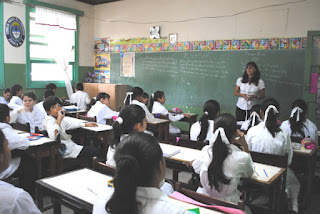Education in Argentina is a responsibility shared by the national government, the provinces and federal district and private institutions, though basic guidelines have historically been set by the Ministry of Education.
Closely associated in Argentina with President Domingo Sarmiento's assertion that "the sovereign should be educated" ("sovereign" referring to the people), education has been extended nearly universally and its maintenance remains central to political and cultural debate.
The education in Argentina known as the Latin American docta has had a convoluted history. There was no effective education plan until President Domingo Sarmiento (1868–1874) placed emphasis on bringing Argentina up-to-date with practices in developed countries.
Sarmiento encouraged the immigration and settling of European educators and built schools and public libraries throughout the country, in a programme that finally doubled the enrollment of students during his term; in Argentina, Teacher's Day (on September 11) commemorates his death.
The first national laws mandating universal, compulsory, free and secular education (Law 1420 of Common Education) were sanctioned in 1884 during the administration of President Julio Roca.
The non-religious character of this system, which forbade parochial schools from issuing official degrees directly but only through a public university, harmed the relations between the Argentine State and the Catholic Church, leading to resistance from the local clergy and a heated conflict with the Holy See (through the Papal Nuncio).
